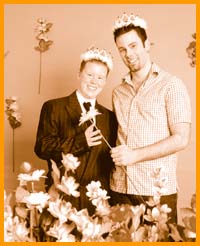It’s two weeks until prom night and 17-year-old Meg Inwood has her outfit picked out: a nice men’s suit with white satin shirt. “It’s my male drag,” she says.
She wishes she could afford a tux, but she admits the suit looks good, maybe good enough to nab her the coveted Prom King crown. She even has two dates lined up for the special night.
Both are “just friends,” one is local, the other is an American whose upcoming visit might coincide with the prom. “If my friend does visit, I’ll go with her. I mean, she’s coming all the way from Kentucky to see me. It’s the least I can do.”
Any other school, any other prom, and Inwood, with her male drag and female escort, might have more worries than double booking her dates. But Inwood is a student at the Triangle Program, a Toronto alternative school for lesbian, gay, bisexual, transsexual and transgendered youth, and the graduation dance she’s attending is Pride Prom 2001, the annual city-wide year-end celebration for queer high school students.
Inwood, who’s in grade 11, came to the Triangle Program in November, “when it became blatantly obvious that things were not going to work out for me at my old school.
“I was having a rough time and I just didn’t need the added pressure of homophobia. I wanted to go to a school where I could relax and be myself. And the Pride Prom is a part of that.
“Proms are this mixture of a school event and a romantic event. And if you’re a queer youth, you’re probably not going to feel comfortable at a regular prom. If you don’t feel safe to bring the date you want to bring, you’re not going to enjoy yourself.”
Toronto’s Pride Prom is one of dozens of gay and lesbian proms happening in larger cities all over North America. And, increasingly in smaller centres, queer youth are making their presence known at their own mainstream proms.
In April, a butch baby dyke named Krystal Bennett created quite a media stir in Ferndale, Washington, her hometown of 8,000, when she brought her girlfriend to her graduation dance and was crowned Prom King by classmates. She received a hug from the prom queen, and Bennett’s runner-up, who is also the prom queen’s boyfriend, told the press, “I’m happy with [the decision]. I like Krystal.”
Some adults, however, were less sanguine. A group of Ferndale parents are trying to enact new gender rules for proms and professional homophobe Reverend Fred Phelps has declared his plans to picket Bennett’s high school graduation ceremony this month.
It’s reactions like this that have made proms not just social events, but sites of political activism for queer youth. Just as graduation dances serve as practice weddings, instructing teenagers in the rituals of romantic celebration, for gay and lesbian youth, the queering of proms is their version of the fight for same-sex marriage recognition.
One of the earliest and certainly the most famous queer prom activist was Aaron Fricke, author of the 1981 book Reflections Of A Rock Lobster: A Story About Growing Up Gay. In 1980, Fricke, then a senior at Cumberland High School in Rhode Island made history and headlines when he sued his school to take a male date to his prom. The school had refused to let him attend, arguing that Fricke would be opening himself up to violence.
Lawyers from the American Civil Liberties Union took up his case, with Fricke testifying at his trial that, “the simple, obvious thing would have been to go to the senior prom with a girl. But that would have been a lie – a lie to myself, to the girl and to all the other students.”
The federal court in Rhode Island eventually ruled that not only did Fricke’s school have to let him attend the prom with his male date , but it also had to provide enough security to ensure the couple’s safety. They went and afterwards Fricke told the press, “I thought of all the people who would have enjoyed going to their proms with the date of their choice, but were denied that right; of all the people in the past who wanted to live respectably with the person they loved but could not; of all the men and women who had been hurt or killed because they were gay; and of the rich history of lesbians and homosexual men that had so long been ignored.
“Gradually we were triumphing over ignorance. One day we would be free.”
The appeal of proms, however, goes far beyond the politics. Easily one of the schmaltziest rites of passage, graduation dances are still one of the most enduring. “It’s one of those events that seems to define the high school experience,” says Patty Barclay, a teacher with the Triangle Program and one of the Pride Prom’s founding organizers.
“Maybe it was all those 1980s movies,” suggests Matt Berriman, 22, a Triangle Program alumni and another member of the Pride Prom organizing committee. “Queer kids all love those ’80s teen movies that glamourize proms and stuff. People look at that and think it’s really cool and they want the same experience.”
Toronto’s first Pride Prom was held in June 1995, organized by the Triangle Program and supporters. The theme was “Somewhere Over The Rainbow: The Prom You Always Wanted, The Prom You Never Had” and both adults and youth were welcome to attend.
“That original prom was a mixed event, as much for adults to reclaim something they felt shut out of in the past, as it was for youth,” says Barclay. “The youth were really into that, but we got some grief from some people at the board of education about having adults attend, and so from then on it’s been limited to high school students and their guests. Of course, we have a few adults there acting as, for lack of a better word, chaperones.”
Barclay says that the Pride Prom attracts a mixed group of youth, from Triangle students and kids from support groups to youth who are fairly out and involved in queer political and cultural groups. “We get kids who come in stunning drag and tuxes and taffeta and others who come in jeans. It’s really open,” she says.
“A lot of the youth who come are out to a certain degree, but there’s many who aren’t. And there’s a number for whom this is their first gay event. That’s one of the reasons why we have a press ban on the prom. We don’t want someone to be inadvertently outed, or for someone who’s kind of shy and nervous to be greeted by a camera. We want everyone to feel safe and comfortable and welcome.”
This year, the organizing committee has expanded its reach outside of the Triangle Program to partner with the Supporting Our Youth Project and the Catalyst Centre. Buddies In Bad Times Theatre is donating its space for the prom and group of educators from the Peel region are preparing and donating food. Much Music VJ Sook Yin Lee is hosting the event and music will be provided by DJs Wasabi and Xenon; all for $10.
“What’s so great about this,” says SOY coordinator Janis Purdy, “is that at every other prom in the city, youth would pay $75 for tickets and $300 for their outfits and it still wouldn’t be as cool as the Pride Prom. This is such a fabulous event. I think the committee has made it really special. They’ve put a new twist on an old tradition.”
Yet for all its uniquely queer twists, it’s the very ordinariness of the event that makes it so special. For one night, queer youth will have the opportunity to participate in a quintessential high school tradition openly, in their own way, without fear of violence or ridicule, without having to once look over their shoulder.
Aspiring prom king Meg Inwood says: “Proms, graduations, all that stuff is important. It’s a big deal when you’re in high school – and queer youth deserve to have their night, too.”


 Why you can trust Xtra
Why you can trust Xtra


